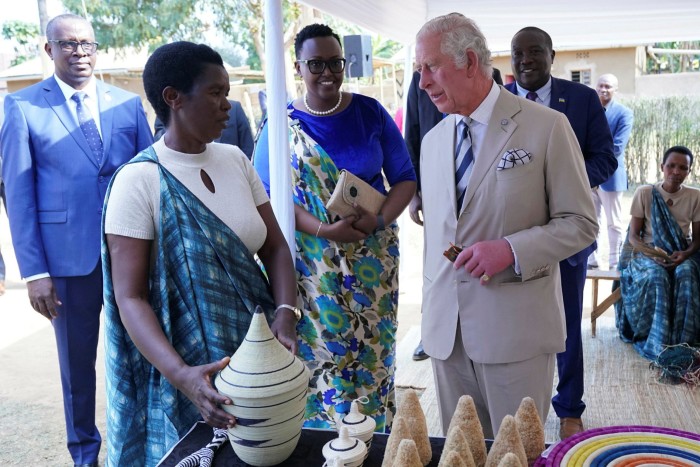Boris Johnson is preparing to defend the UK government’s contentious policy of sending asylum seekers to Rwanda when the prime minister meets Prince Charles in Kigali at a Commonwealth summit.
The heir to the throne will represent Queen Elizabeth at the Commonwealth heads of government meeting that officially opens on Friday and is being attended by most of the leaders of the organisation’s 54 member countries.
The UK has agreed to pay Rwanda £120mn to take asylum seekers for resettlement, in an attempt to deter them from coming to Britain by crossing the English Channel in small boats.
But last week an aircraft carrying the first seven people bound for Rwanda failed to take off from Britain after last-minute rulings by the European Court of Human Rights in Strasbourg and Court of Appeal in London.
Prince Charles has privately characterised the UK government’s plan to send asylum seekers to Rwanda as “appalling”, The Times reported earlier this month.
The policy is expected to be discussed when Johnson meets Prince Charles in Kigali on Friday, according to UK government officials.
One official said: “If and when the immigration policy is raised then you can expect the prime minister to defend it vigorously.”
When the Times published its story, a spokesperson for Prince Charles would not be drawn on whether or not he opposed the policy, but stressed the prince was in no way attempting to influence the government.
The UK plan to send asylum seekers to Rwanda has polarised British opinion, with the archbishops of Canterbury and York, and 23 bishops, describing the policy as “immoral”.
But it is popular with many Conservative MPs, who hope it will be an effective means of establishing control over Britain’s sea border.

Johnson said as he left London for Rwanda that he wanted to end “condescending” attitudes towards the African country.
“I think it’s an opportunity for us to . . . understand for ourselves, what that partnership has to offer and . . . help others to shed some of that condescending attitudes towards Rwanda and how that partnership might work,” the prime minister told reporters at Stansted airport.
He is not planning to visit the Rwandan accommodation that has been prepared for asylum seekers coming from the UK.
Government officials said this was not because the policy was bogged down in legal challenges.
Meanwhile, Downing Street said Johnson wanted to use the Commonwealth summit to launch initiatives to tackle issues including food insecurity following Russia’s invasion of Ukraine.
In a nod to how the Queen has just celebrated 70 years on the throne, the UK is also planning “platinum partnerships” to bolster trade with key Commonwealth countries.
Leaders at the Commonwealth summit are due to decide whether Baroness Patricia Scotland, a former Labour minister, should continue as the organisation’s secretary-general.
Johnson has publicly backed Kamina Johnson Smith, Jamaica’s foreign minister, as the next secretary-general in an effort to prevent Scotland from serving a full second term.

One UK government official said there were “quite a lot of reasons” why Britain was not supporting Scotland.
“We do not believe she has provided the effective and unified leadership we would have liked, there has been a lack of focus,” added the official.
Allies of the peer have accused Johnson of running a “vendetta” against her because she refuses to “do the UK’s bidding”.
Scotland’s first four-year term concluded in 2020, at which point Johnson canvassed Commonwealth leaders on replacing her.
However, she stayed in position during the tumult of the Covid-19 crisis. The Commonwealth summit in Rwanda, originally scheduled for June 2020, was repeatedly delayed.
As a result, Scotland is only seeking to remain Commonwealth secretary-general for another two years.
By contrast Smith, if selected by Commonwealth leaders, would embark on a four-year term.
“She has run a positive campaign, she is campaigning on her merits and skills and experience, which I think is exactly the right way to go,” said the UK government official.

